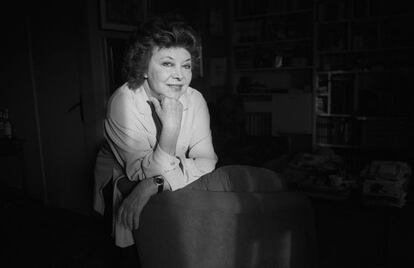The actress who turned down Orson
María Asquerino, who railed against Franco and acted for Buñuel, has died at 85

The Spanish acting world has been mourning the loss of not one, but two of its leading lights in recent days. Prior to the passing of actor José Sancho last weekend, stage, film and TV actress María Asquerino died on February 26 after suffering a respiratory condition. She was 85.
Over her 70-year career, Asquerino worked with some of Spain’s best-known moviemakers, including Luis Buñuel, Fernando Fernán Gómez, Alex de la Iglesia, Rafael Gil, José Antonio Nieves Conde, José María Forqué, José Luis Garci and Agustín Díaz Yanes. On the stage she collaborated with talents such as José Luis Alonso, Jaime Azpilicueta, Josefina Molina, Lluis Pascual and Carles Alfaro, who directed her in her last performance, in Chekhov’s Uncle Vanya. She decided to retire, she said, because “now it’s fine to just mess around.”
Asquerino was also a free spirit who railed against the Franco regime; the moral meanness of the society in which she had to live; the Christian doctrine that branded the women of her generation; and, above all, the conservatism that restricted her complete freedom. “The dictatorship took up my best years, but that gave me strength to fight,” she said three years ago.
Asquerino used to say it was her stature and her voice that made her seem bossy, “but deep down I am silly and soft.”
She was born María Serrano Muro to actor parents in Madrid in 1925, though some sources give 1926 or 1927. She debuted on stage at the age of 13 alongside her mother and father, later progressing to the Comedia de Madrid company. In her 1987 memoir, Memorias, she confessed that she had led a sad and solitary childhood and at the age of 17 married a man who was very jealous. “He was what today would be called an abuser. And I was a child.”
One of her great contributions to Spanish cinema was her portrayal of the character of Pili in José Antonio Nieves Conde’s landmark drama Surcos (1950), where she demonstrated her ability to compete with the greatest actresses of Italian neorealism.
She appeared in over 80 films, notably Buñuel’s That Obscure Object of Desire, Forqué’s El juego de la verdad, Nino Quevedo’s Goya, historia de una soledad, De la Iglesia’s Muertos de risa and La comunidad, and Fernán-Gómez’s Mambrú se fue a la guerra, El mar y el tiempo and Fuera de Juego.
In Memorias, she confessed that she was deeply in love with Fernán-Gómez and regretted never having a child with the multi-talented actor-director.
Asquerino was always considered free, modern and an icon of Madrid nightlife, above all because of her love for café debates. One time, after dancing with Orson Welles at the Cannes Film Festival, she turned down his request to accompany him back to his hotel — because she didn’t fancy it, not because of what they would say. It wasn’t a big deal, but it infuriated Welles.
Tu suscripción se está usando en otro dispositivo
¿Quieres añadir otro usuario a tu suscripción?
Si continúas leyendo en este dispositivo, no se podrá leer en el otro.
FlechaTu suscripción se está usando en otro dispositivo y solo puedes acceder a EL PAÍS desde un dispositivo a la vez.
Si quieres compartir tu cuenta, cambia tu suscripción a la modalidad Premium, así podrás añadir otro usuario. Cada uno accederá con su propia cuenta de email, lo que os permitirá personalizar vuestra experiencia en EL PAÍS.
¿Tienes una suscripción de empresa? Accede aquí para contratar más cuentas.
En el caso de no saber quién está usando tu cuenta, te recomendamos cambiar tu contraseña aquí.
Si decides continuar compartiendo tu cuenta, este mensaje se mostrará en tu dispositivo y en el de la otra persona que está usando tu cuenta de forma indefinida, afectando a tu experiencia de lectura. Puedes consultar aquí los términos y condiciones de la suscripción digital.








































